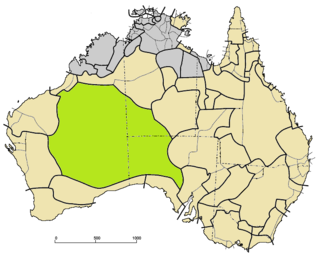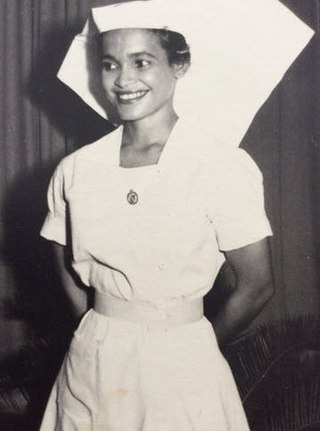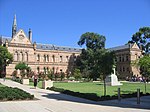Related Research Articles

The University of Adelaide is a public research university located in Adelaide, South Australia. Established in 1874, it is the third-oldest university in Australia. The university's main campus is located on North Terrace in the Adelaide city centre, adjacent to the Art Gallery of South Australia, the South Australian Museum, and the State Library of South Australia.

The Indigenous languages of Australia number in the hundreds, the precise number being quite uncertain, although there is a range of estimates from a minimum of around 250 up to possibly 363. The Indigenous languages of Australia comprise numerous language families and isolates, perhaps as many as 13, spoken by the Indigenous peoples of mainland Australia and a few nearby islands. The relationships between the language families are not clear at present although there are proposals to link some into larger groupings. Despite this uncertainty, the Indigenous Australian languages are collectively covered by the technical term "Australian languages", or the "Australian family".

Indigenous music of Australia comprises the music of the Aboriginal and Torres Strait Islander peoples of Australia, intersecting with their cultural and ceremonial observances, through the millennia of their individual and collective histories to the present day. The traditional forms include many aspects of performance and musical instrumentation that are unique to particular regions or Aboriginal Australian groups; and some elements of musical tradition are common or widespread through much of the Australian continent, and even beyond. The music of the Torres Strait Islanders is related to that of adjacent parts of New Guinea. Music is a vital part of Indigenous Australians' cultural maintenance.

Lowitja Lois O'Donoghue Smart, is an Aboriginal Australian retired public administrator. In 1990-1996 she was the inaugural chairperson of the Aboriginal and Torres Strait Islander Commission (ATSIC). She is patron of the Lowitja Institute, a research institute for Aboriginal & Torres Strait Islander health and wellbeing.

The Elder Conservatorium of Music, also known as "The Con", is Australia's senior academy of music and is located in the centre of Adelaide, the capital of South Australia. It is named in honour of its benefactor, Sir Thomas Elder. Dating in its earliest form from 1883, it has a history in professional training for musical performance, musical composition, research in all fields of music, and music education. The Elder Conservatorium of Music and its forerunners have been parts of the University of Adelaide since the early 1880s.
Kaurna is a Pama-Nyungan language historically spoken by the Kaurna peoples of the Adelaide Plains of South Australia. The Kaurna peoples are made up of various tribal clan groups, each with their own parnkarra district of land and local dialect. These dialects were historically spoken in the area bounded by Crystal Brook and Clare in the north, Cape Jervis in the south, and just over the Mount Lofty Ranges. Kaurna ceased to be spoken on an everyday basis in the 19th century and the last known native speaker, Ivaritji, died in 1929. Language revival efforts began in the 1980s, with the language now frequently used for ceremonial purposes, such as dual naming and welcome to country ceremonies.

The Western Desert language, or Wati, is a dialect cluster of Australian Aboriginal languages in the Pama–Nyungan family.
The languages of Australia are the major historic and current languages used in Australia and its offshore islands. Over 250 Australian Aboriginal languages are thought to have existed at the time of first European contact. English is the majority language of Australia today. Although English has no official legal status, it is the de facto official and national language. Australian English is a major variety of the language with a distinctive accent and lexicon, and differs slightly from other varieties of English in grammar and spelling.

Pitjantjatjara is a dialect of the Western Desert language traditionally spoken by the Pitjantjatjara people of Central Australia. It is mutually intelligible with other varieties of the Western Desert language, and is particularly closely related to the Yankunytjatjara dialect. The names for the two groups are based on their respective words for 'come/go.'
No Fixed Address (NFA) are an Australian reggae rock group whose members are all Aboriginal Australians, mostly from South Australia. The band formed in 1979, split in 1984, with several brief reformations or guest appearances in 1987–1988 and 2008, before reuniting in 2016 and performing several times since then.

Amata is an Aboriginal community in the Anangu Pitjantjatjara Yankunytjatjara Lands in South Australia, comprising one of the six main communities on "The Lands".
Us Mob were an Aboriginal reggae rock band from South Australia.

Lewis Yarlupurka O'Brien, usually known as Uncle Lewis O'Brien, is an Aboriginal elder of the Kaurna people.
Tiger Palpatja was an Australian Aboriginal artist from the Aṉangu Pitjantjatjara Yankunytjatjara Lands.

MaryAnn Bin-Sallik is Djaru Elder and Australian academic, specialising in Indigenous studies and culture. She was the first Indigenous Australian to gain a doctorate from Harvard University.

Electric Fields is an Aboriginal Australian electronic music duo made up of vocalist Zaachariaha Fielding and keyboard player and producer Michael Ross. Electric Fields combine modern electric-soul music with Aboriginal culture and sing in Pitjantjatjara, Yankunytjatjara and English. The duo have released an EP and several singles.
Tarnanthi is a Festival of Contemporary Aboriginal and Torres Strait Islander Art held in Adelaide, South Australia, annually. Presented by the Art Gallery of South Australia (AGSA) in association with the South Australian Government and BHP. It is curated by Nici Cumpston.

The Kokatha language, also written Kukatha, Kokata, Gugada, and other variants, and also referred to as Madutara, Maduwonga, Nganitjidi, Wanggamadu, and Yallingarra and variant spellings of these, is an Australian Aboriginal language of the Western Desert group traditionally spoken by the Kokatha people, whose traditional lands are in the western part of the state of South Australia, north of the Wirangu people.
Dem Mob, stylised as DEM MOB, is an Aboriginal hip hop group from the APY lands in northern South Australia, the first to rap in the Pitjantjatjara language.
Catherine Joan Ellis was an Australian ethnomusicologist. She co-founded the Centre for Aboriginal Studies in Music (CASM) at the University of Adelaide in 1972.
References
- 1 2 3 4 5 6 7 8 9 10 11 12 "Centre for Aboriginal Studies in Music (CASM) - Elder Conservatorium of Music". University of Adelaide. Archived from the original on 5 November 2020. Retrieved 9 April 2023.
- ↑ Gemes, Juno. "Leila Rankine, Director And Founder of CASM, Adelaide Centre for Aboriginal Studies in Music, by Juno Gemes, b.1944 Aust on Josef Lebovic Gallery" (photo and text). Josef Lebovic Gallery. Photograph by Juno Gemes . Retrieved 9 April 2023.
- 1 2 3 Kovacic, Leonarda; Lemon, Barbara (2019). "Rankine, Dorothy Leila - Woman". The Australian Women's Register . National Foundation for Australian Women & University of Melbourne . Retrieved 9 April 2023.
Created: 25 May 2005, Last modified: 12 February 2019
- 1 2 3 4 5 6 7 8 9 10 11 Skujins, Angela (3 April 2023). "Fifty years of CASM". CityMag . Retrieved 9 April 2023.
- ↑ Yengi, Ben L. (1982). "The uniqueness of the Centre for Aboriginal Studies in Music [extract]". The Australian Journal of Indigenous Education . Cambridge University Press (CUP). 10 (2): 44–50. doi:10.1017/s0310582200012062. ISSN 0310-5822.
- ↑ "New Indigenous language and music centre". The West Australian . 28 November 2016. Retrieved 9 April 2023.
- ↑ "About NCALMS - National Centre for Aboriginal Language and Music Studies". University of Adelaide. Archived from the original on 9 April 2021. Retrieved 9 April 2023.
- ↑ "Let Our Songs Speak for Us - Celebrating 50 years of the Centre of Aboriginal Studies in Music". Experience Adelaide. 10 March 2023. Retrieved 9 April 2023.
- ↑ "University of Adelaide announces Indigenous leadership for CASM". India Education. 7 April 2023. Retrieved 9 April 2023.
- ↑ Von Einem, Johnny (18 May 2023). "DEM MOB added to Primavera Sound 2023 lineup". CityMag . Retrieved 21 May 2023.
- ↑ "University of Adelaide, Adelaide Elder Conservatorium of Music; Centre for Aboriginal Studies in Music (CASM)". International Directory of Music and Music Education Institutions. Retrieved 9 April 2023.
- ↑ "Tjungaringanyi". The University of Adelaide. 1 January 1972. Retrieved 9 April 2023.
- ↑ "Tjungaringanyi / Centre for Aboriginal Studies in Music" (library catalogue entry). National Library of Australia . Retrieved 9 April 2023.
- ↑ Crombie, Elaine (9 December 2016). "I am living proof of the stolen generation. Trust me, the trauma is real". The Guardian . Retrieved 9 April 2023.
- ↑ McFarlane, Ian (1999). "Encyclopedia entry for 'Joe Geia'". Encyclopedia of Australian Rock and Pop . St Leonards, NSW: Allen & Unwin. ISBN 1-86508-072-1. Archived from the original on 16 May 2003. Retrieved 9 April 2023.
- ↑ Morris, Linda (29 April 2016). "Bangarra Dance Theatre shattered by death of composer David Page". Sydney Morning Herald . Retrieved 9 April 2023.
- ↑ Tijs, Andrew (24 December 2013). "Melbourne Indigenous Arts Festival 2014". Time Out . Archived from the original on 30 January 2014. Retrieved 3 July 2014.
